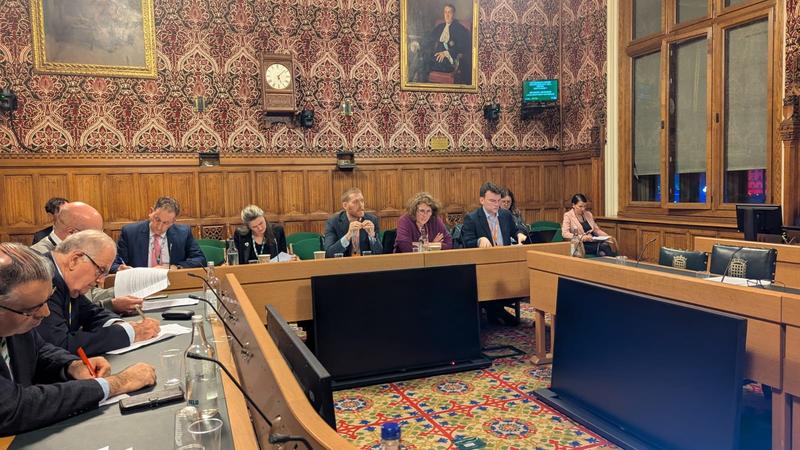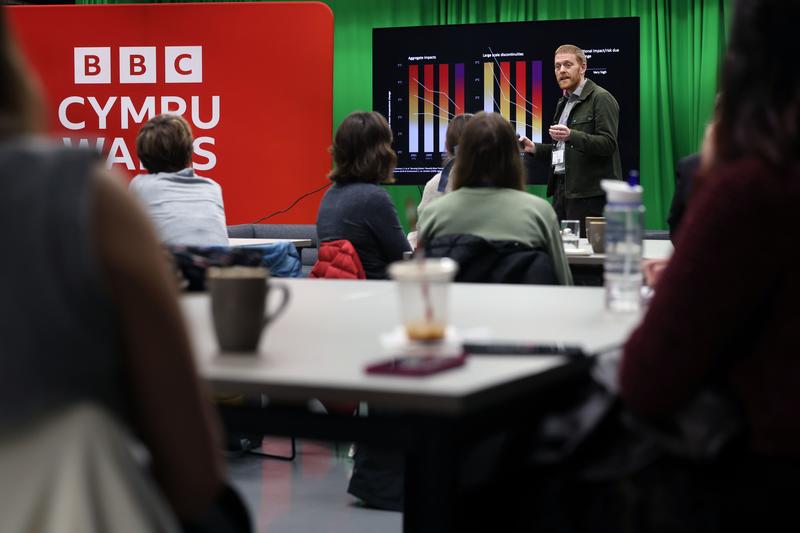Hope arrives when you can imagine a better path to the future and you start taking action to get there
An interview with Professor Paul Behrens
Professor Paul Behrens is a scientist uncompromising in his call to action. He resists the label 'optimist', insisting that hope, not optimism, must be earned through urgent effort. 'We need to act faster on climate change, as if our lives depend on it - because they do! Action builds hope and we must create the future we want,' he tells me. In our conversation spanning climate change, energy futures, and the transformation of food systems, Behrens balances recognition of some promising societal changes and innovations with clear-eyed concern over accelerating climate impacts, especially on agriculture: 'the threats to food systems are why so much of my research focuses on what we eat and how we grow it.'

It was these concerns for the environment and climate change that first led Professor Behrens away from astrophysics and his work on telescopes, towards climate change and energy transitions. 'It was time to come back down to earth!' he says. Using what he had learned about atmospheric physics to improve images from telescopes, he spent his PhD at the University of Auckland developing new ways to find the right locations for wind turbines in hilly regions, where turbulence complicates how they work. It was not a straight path into academia either. After his PhD, Behrens spent time working on science policy with the Royal Society of New Zealand, doing some work with Antarctic researchers, as a science correspondent for national radio, and exploring how to improve the nation's electricity grid. He realised that his broad environmental and policy interests would be best placed back in the academy.
Returning to Europe, Behrens joined Leiden University in the Netherlands, teaching a variety of courses from mathematics to sustainability, and becoming increasingly involved in the field of industrial ecology - an approach that addresses environmental problems with systems thinking. At Leiden, Behrens published a popular science book on climate change - The Best of Times, The Worst of Times, co-authored a food and sustainability text book, and his team were awarded International Champion of the 2023 Frontiers Planet Prize, as judged by 100 international experts. In 2024, he began a British Academy Global Professorship at the Oxford Martin School, where he will focus for the next four years on accelerating food system transformations.
The food system is going to change one way or another
Behrens believes in tackling the biggest drivers of environmental damage head-on. 'If you can make a small shift in the parts of the system causing the biggest harm, it has a massive impact', he explains. This has compelled him to concentrate on how diets need to change. 'In high-income countries like the UK, moving toward plant-rich diets is the single biggest opportunity to reduce the environmental impacts of our food'. His work has shown that if we were to eat more plants in the UK, we could reduce food-related climate emissions by around 60% and save an area almost the size of Scotland. He tells me that 'animals occupy 75-80% of all agricultural land, yet deliver far fewer calories and proteins than plants. There are multiple wins waiting by making the dietary shift - more nature, cleaner water and air, fewer diseases like bird flu or antibiotic resistance, higher animal welfare. We will wonder why we didn't act sooner.'

This shift, he believes, is inevitable. 'Either we change diets ourselves, or the environmental damage will force a change - making animal products less affordable and less available. Climate effects we thought were decades away are happening now, from ice sheet collapse to heat extremes. And the food system is especially exposed.'
We don't truly choose what we eat. Our options are shaped by subsidies, policy, and corporate influence.
Yet, Behrens is unsure if we will see the rapid change in diets needed. There is some evidence that society can reach tipping points where technologies or habits change very quickly. For example, renewable energy has become incredibly cheap, making it the cheapest energy today. The food system has more actors and more moving parts that make change more challenging. We often hear that people should be free to eat what they want to eat. Behrens suggests, 'We don't truly choose what we eat. Our options are shaped by subsidies, policy, and corporate influence'. But that doesn't mean we don't have real power in our choices: 'Every meal is a vote for a better system'.
Behrens explains, 'as we choose more plants in our diet, then chefs, restaurants, supermarkets, food producers, and politicians will all respond, making more options available in the food environment and changing the price of that food. That makes it easier for other people to make different choices.' Research shows that the more plant-based options become available, even big meat-eaters will try them. If we know that other people are trying more plant-rich food, we are more likely to as well. 'It's not about abstinence, it is about exploration, and it is much easier to explore plant options than it used to be'. Many are sceptical about people's willingness to shift their diets, even if that shift would be better for their health. 'We do need systemic change to food environments,' Behrens notes. He highlights the Danish Action Plan on Plant-based Foods as an example of joined-up thinking. The plan addresses the entire food supply chain, from requiring a selection of plant-based offers in government facilities like prisons, hospitals and schools, to innovation funds for farmers, producers and food processors. The key to the Action Plan, Professor Behrens explains, is how it was sold as eating more plants, not as eating less meat (which is the side-effect.)

'The Danish Action Plan is even more remarkable because they managed to get so many different interests on board. Vested interests in many countries, especially big fossil fuel and agriculture businesses, are preventing much of the change we need to see. Multiple studies reveal how these sectors mislead the public and policymakers. That makes the role of scientists even more critical - to push back, clarify and inform. Behrens has been involved in efforts to correct misinformation in the scientific literature, and in communicating the implications of climate science. Despite the scale of the challenge, Behrens sees hope in the potential of collective action, and in our tendency to underestimate one another's concern. 'We think we're isolated in wanting action on climate or food, but surveys show that public support is often far more than what people assume. That is true in the UK and elsewhere.' The same is true in academia. 'Most scientists want to engage more in advocacy, and the majority believe that advocacy doesn't harm academic credibility. There's growing momentum for taking a stand.'
I ask Behrens if he feels less hopeful now than when he began his career. 'I don't think about hope much anymore. What matters is understanding where we are headed, so we prepare ourselves and don't slide into despair. But also that we realise the immense benefits of taking action and talking about that action. I think hope arrives when you can imagine a better path to the future and when you start taking action to get there. The same is true for both individuals and community action. Personally, I felt so much better when I decided to eat more plants and stop flying. People's actions and journeys will differ, but it is all about imagining a better future and taking a first step towards it.'




